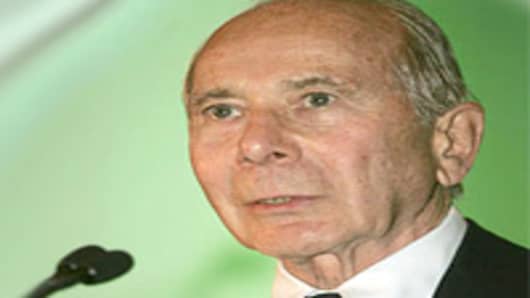But for close to 40 years, the AIG name was almost inseparable from Greenberg's. It was Greenberg who built it up from an insurance backwater into an enormous international financial conglomerate. He presided over three decades of its ascent, left under pressure three and a half years before its fall—and is now suing AIG, or what's left of it, for mismanaging the empire he left.
On the surface, the stakes involved in Greenberg's lawsuit filed earlier this month—before the current revelations about AIG's massive bonuses—might seem small. The $70 million in taxes that Greenberg paid on shares AIG gave him that are now worthless sounds like barely a footnote amid the storm of the hundreds of billions of AIG's losses.
The question at stake in Greenberg's suit, however, goes to the heart of what went wrong in American business: Is the current catastrophe the fault of people like Greenberg, who built the edifices that so rapidly came tumbling down, or of the folks left to mind the store just long enough to wreck and pillage it?
Hank Greenberg was one of a generation of charismatic tycoons who built the companies that are now at the center of the current scandal. Now 85 years old, he is of the same cohort as longtime Bear Stearns Chairman Alan "Ace" Greenberg and Citigroup titan Sanford Weill. You can think of these men as the patriarchs.
The paths they took to the pinnacle of finance were different—Ace Greenberg spent his whole career at Bear Stearns, rising through the ranks; Hank Greenberg joined AIG as a rising executive and vaulted to the CEO spot in 1968; Weill built Citigroup through a long series of audacious acquisitions—but at the turn of the millennium, each of them led companies so marked by their stamp that it was almost impossible to refer to Bear, Citi, or AIG without in the same sentence mentioning Ace Greenberg, Hank Greenberg, or Sandy Weill.
_____________________________________
More From The Big Money:
_____________________________________
Of the three, it's Hank Greenberg who was the most controversial. Greenberg resigned as CEO of AIG in 2005, his reputation wrecked by an accounting scandal in which AIG overstated the value of its assets. He was then 79, and there is every indication that he would have held on even longer had he not been forced to quit (possibly, according to Greenberg's lawyer, David Boies, because the New York State attorney's office threatened to bring criminal charges against the company if he did not).
The implicit question posed by Greenberg's suit, and one of the great historical questions that looms over the AIG fiasco, is whether things would have turned out differently with Greenberg at the helm. It is not a question with an easy answer.
On the one hand, the accounting irregularities that AIG engaged in on Greenberg's watch are not trivial. It was clearly a company that aggressively pushed the boundaries of what was safe for a giant insurer to do and in some cases went beyond them—AIG paid a $1.6 billion fine to regulators.
Yet on the other hand, tarnished reputation or not, after Greenberg left, and long before the current meltdown, it was Hank Greenberg himself who emerged as one of the fiercest critics of AIG management. "There's no leadership there," Greenberg told Business Week in 2006, a year after he was forced to resign. "The place is run by outside lawyers." You can chalk some of that up to sour grapes, and the argument that AIG's problem was too many lawyers is not really especially convincing. But the blunt appraisal that there was no leadership turned out to be prescient. Having left AIG under a very dark cloud, Greenberg undoubtedly relished the opportunity to turn the tables when he was called to testify before Congress last year about the fall of the company he built.


